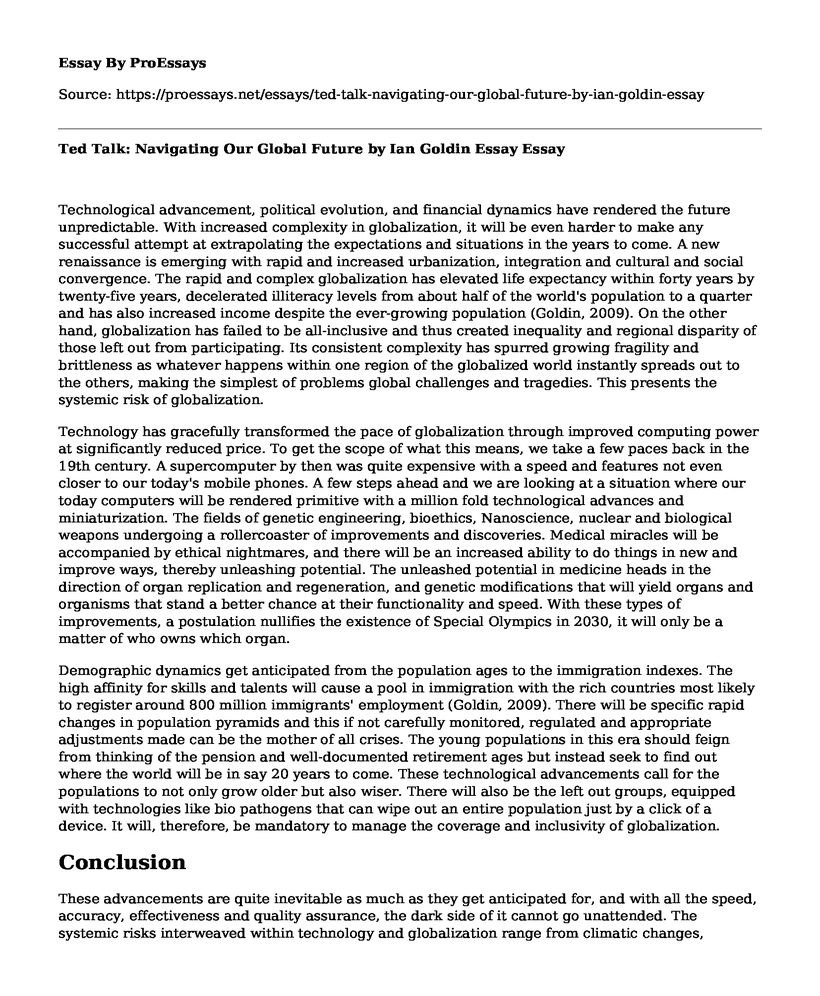Technological advancement, political evolution, and financial dynamics have rendered the future unpredictable. With increased complexity in globalization, it will be even harder to make any successful attempt at extrapolating the expectations and situations in the years to come. A new renaissance is emerging with rapid and increased urbanization, integration and cultural and social convergence. The rapid and complex globalization has elevated life expectancy within forty years by twenty-five years, decelerated illiteracy levels from about half of the world's population to a quarter and has also increased income despite the ever-growing population (Goldin, 2009). On the other hand, globalization has failed to be all-inclusive and thus created inequality and regional disparity of those left out from participating. Its consistent complexity has spurred growing fragility and brittleness as whatever happens within one region of the globalized world instantly spreads out to the others, making the simplest of problems global challenges and tragedies. This presents the systemic risk of globalization.
Technology has gracefully transformed the pace of globalization through improved computing power at significantly reduced price. To get the scope of what this means, we take a few paces back in the 19th century. A supercomputer by then was quite expensive with a speed and features not even closer to our today's mobile phones. A few steps ahead and we are looking at a situation where our today computers will be rendered primitive with a million fold technological advances and miniaturization. The fields of genetic engineering, bioethics, Nanoscience, nuclear and biological weapons undergoing a rollercoaster of improvements and discoveries. Medical miracles will be accompanied by ethical nightmares, and there will be an increased ability to do things in new and improve ways, thereby unleashing potential. The unleashed potential in medicine heads in the direction of organ replication and regeneration, and genetic modifications that will yield organs and organisms that stand a better chance at their functionality and speed. With these types of improvements, a postulation nullifies the existence of Special Olympics in 2030, it will only be a matter of who owns which organ.
Demographic dynamics get anticipated from the population ages to the immigration indexes. The high affinity for skills and talents will cause a pool in immigration with the rich countries most likely to register around 800 million immigrants' employment (Goldin, 2009). There will be specific rapid changes in population pyramids and this if not carefully monitored, regulated and appropriate adjustments made can be the mother of all crises. The young populations in this era should feign from thinking of the pension and well-documented retirement ages but instead seek to find out where the world will be in say 20 years to come. These technological advancements call for the populations to not only grow older but also wiser. There will also be the left out groups, equipped with technologies like bio pathogens that can wipe out an entire population just by a click of a device. It will, therefore, be mandatory to manage the coverage and inclusivity of globalization.
Conclusion
These advancements are quite inevitable as much as they get anticipated for, and with all the speed, accuracy, effectiveness and quality assurance, the dark side of it cannot go unattended. The systemic risks interweaved within technology and globalization range from climatic changes, pandemics, collapsing biodiversity and financial crisis. It is up to the individuals and population to be innovative in countering these risk and for them to have "an understanding that the glory of globalization could also be its downfall." The current government cannot possibly cope or tackle the challenge, and it's up to the societies to join hands through collective wisdom because when we all come together, amazing things happen. We all need to scrutinize our ideas and ensure that they reflect a great century and not one with Eco-affluence, Eco-disaster, and Eco-collapse.
References
Goldin Ian (2009). TED talk: Navigating our global future. http://www.youtube.com/watch?v=KuWXfjyGhk0
Cite this page
Ted Talk: Navigating Our Global Future by Ian Goldin Essay. (2022, Jun 19). Retrieved from https://proessays.net/essays/ted-talk-navigating-our-global-future-by-ian-goldin-essay
If you are the original author of this essay and no longer wish to have it published on the ProEssays website, please click below to request its removal:
- Research Proposal on Impact of Artificial Intelligence on Audit Firms
- Solar Smashes Wind Energy in the 1st German Technology Tender Essay
- Local and Global Business Opportunities for Countries Paper Example
- China's Tech Innovation: Race to the Top of the Digital Space - Research Proposal
- Crisis Management: Leveraging Communication to Manage Latent Crisis Circumstances - Essay Sample
- DOL Projects Increase in Salary Threshold for White-Collar Exemptions - Essay Sample
- Paper Example on Amazon.com: Global Giant in Retail E-commerce, CSR Commitment Questioned







